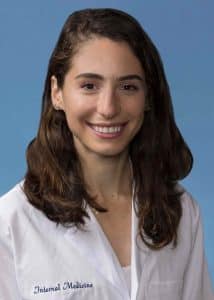Rachel Sarnoff, MD, MSCR Candidate, Shares Her Visiting Scholar Experience
On July 8-11, 2024, Rachel Sarnoff, MD, MSCR Candidate completed the Rome Foundation-DrossmanCare Visiting Scholar Program.

The Visiting Scholar Program is a great opportunity for clinicians and researchers to engage with key leaders, including Rome Foundation Board members and other international experts, to learn not only about DGBI diagnosis and treatment but also about advanced communication skills and targeted research methods.
This program is open to clinicians and scientists in gastroenterology, primary care, psychologists, advanced practice providers (NP/PA), and dietitians. The attendees usually spend two to three days on-site or longer by arrangement. This program is critical to help develop and inspire the next generation of providers to become skilled communicators and exceptional clinicians treating patients with DGBI.
When asked about her experience, Dr. Sarnoff gave this summary:
I chose to apply for the Visiting Scholar Program with the Rome Foundation/DrossmanCare towards the tail end of clinical training in my Disorders of Gut-Brain Interaction-Internal Medicine Physician Scientist Training Program (which my mentor and DGBI Specialist Dr. Lin Chang and I designed together). The rotation was one of the most meaningful learning experiences I have ever had.
The patient visits in which I participated were unlike any I had experienced prior. We performed a full intake of the patient’s symptoms, but also their backgrounds and life contexts, psychological histories, and home environments, all of which can influence how our central and peripheral nervous systems can get dysregulated. We then performed comprehensive physical exams (including rectal exam, rectal hypersensitivity testing, and balloon expulsion test), and formulated a patient-centered assessment and therapeutic plan. The visits were not rushed: we took the time that the patient needed and deserved, and the patients clearly felt seen and heard like they never had been before. Dr. Drossman’s use of helpful, easy-to-understand visual aids and reading materials with the patients empowered them to step into a place of knowledge and clarity about what was happening in their body; this itself, I could see, was incredibly healing for them. Seeing both new and return visits together, I also had the opportunity to observe how patients’ symptom courses evolved over time, and how the relationship with Dr. Drossman and the therapeutic interventions could so meaningfully change their lives. It was amazingly gratifying to see patients who at one point were essentially home-ridden, on disability, now be more integrated into society, able to work and take vacations and participate in other activities that felt impossible prior. During the visits, I noticed that emotions were expressed freely and frequently, as the patients could clearly feel how safe and honest of a space Dr. Drossman and his PA Elizabeth Smith held for them.
I learned a great deal from the way Dr. Drossman engaged in sharing our assessment and plan with the patient. Instead of a one-way communication of our thoughts, he instead involved the patient in this assessment and plan. He asked what the patient thought was going on, and what they were most open to in terms of therapeutics. For return patients, he would ask, “is there anything you think we should be doing differently?” rather than unilaterally suggesting changes where there might not be a patient-centered need or want. The patients clearly responded positively to their involvement in the plan, and they seemed more motivated to execute the plan given this involvement. I also appreciated his advanced and nuanced approach to neuromodulator therapies and my comfort with utilizing them – as well as using multiple at once – significantly increased after the rotation. Finally, I had the opportunity to participate in a Biofeedback/Pelvic Floor Physical Therapy Teaching Session with his colleague and pelvic floor physical therapist, Jennifer Harrington. I had never had the opportunity to participate in such a session prior and learned a great deal from Jennifer and her unique, dual expertise in Pelvic Floor Physical Therapy and Biofeedback. I learned about how to cue patients and interpret the Biofeedback digital readouts as well as appropriate indications for Biofeedback vs. Pelvic Floor PT.
Overall, I was incredibly moved and inspired by the experience of the Visiting Scholars Program. I will bring into my practice newfound learnings, perspective, and expertise that I believe no other program could have given me.
